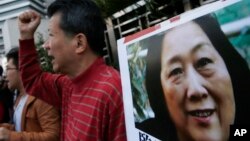Imprisoned veteran Chinese journalist Gao Yu, 71, was released on medical parole on Friday, one day after Beijing’s high court ruled to reduce her sentence from seven years to five years on appeal, according to her lawyer Shang Baojun.
Despite her release, rights advocates lamented that her conviction for leaking state secrets was not overturned, despite the widespread criticism of her case.
Lawyer Shang confirmed Friday that Gao has left prison, putting an end to her seven-month detention.
He added that Gao’s confession during her second trial was the reason the Beijing high court’s decided to change the verdict on Thursday. He said it is too early to say whether Gao will continue to appeal since she needs to first tend to her deteriorating health.
Disease, age
“She suffered from high blood pressure, heart disease and Meniere’s disease with serious conditions. … These disease are hard to [control]. Plus, with her age, they won’t be easily cured,” Shang said.
Earlier this year, Gao was convicted of sharing a Communist Party document, known as Document No. 9, with overseas news magazine Mingjing News.
The document details the party leadership’s resolve to aggressively target constitutionality and press freedoms groups and others who seek to change society.
It also warns that Western ideals, such as democracy and human rights, threaten the party’s grip on power.
During an appeal, the magazine had said Gao did not provide the document. Gao’s lawyers had also presented evidence to show Gao was not the source of the report. But none of those testimonies in her favor were accepted by the court.
Document No. 9
Gao’s trials have been scrutinized by free speech advocates and foreign governments, including the United States. Critics have expressed skepticism that the document she was accused of leaking is regarded as a national secret.
Chinese dissent Paul Lin said some light had been shed on the document before it was first reported on Mingjing News.
“What she [Gao] had leaked were internal comments made by those of [the Communist Party’s] left-wing extremists.” Lin said the comments were aimed at assuaging internal party factions who were worried about reports that painted Chinese President Xi Jinping as a reformer.
“She is not guilty of anything. Neither was that document any secret,” the commentator added.
Not a sign of easing control
Even though Gao has been released, the latest development cannot be seen as a sign that China will ease its control on press freedom, Lin added.
On Gao’s case, “[China] appears to have made some concessions, bowing to pressures from foreign governments [and human rights groups]. That has something to do with the fact that China is faced with many domestic conflicts as well as international isolation,” he said.
The United States was among those groups that criticized Gao's sentence. Earlier this week, a State Department spokesman called for her immediate release.
Ever since it came to power, the Xi administration has been tightening controls on civil society, jailing and sentencing rights activists, government critics and lawyers.




